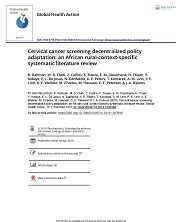Worldwide, nearly 570,000 women are diagnosed with cervical cancer each year, with 85% of new cases in low- and middle-income countries. The African continent is home to 35 of 40 countries with the highest cervical cancer mortality rates. In 2014, a partnership involving a rural region of Senegal, West Africa, was facing cervical cancer screening service sustainability barriers and began adapting regional-level policy to address implementation challenges.
This manuscript reports the findings of a systematic literature review describing the implementation of decentralized cervical cancer prevention services in Africa, relevant in context to the Senegal partnership. The authors report barriers and policy-relevant recommendations through Levesque’s Patient-Centered Access to Healthcare Framework and discuss the impact of this information on the partnership’s approach to shaping Senegal’s regional cervical cancer screening policy.
Overall, there is a paucity of published literature regarding barriers to and best practices in the implementation of cervical cancer screening services in rural Africa. Many articles in this literature review did describe findings with notable policy implications. The Senegal partnership has consulted this literature when faced with various similar barriers and has developed two principal initiatives to address contextual challenges. Other initiatives implementing cervical cancer visual screening services in decentralized areas may find this contextual reporting of a literature review helpful as a construct for identifying evidence for the purpose of guiding ongoing health service policy adaptation.
Authors: R. Rahman, M D. Clark, Z. Collins, F. Traore, E. M. Dioukhane, H. Thiam, Y. Ndiaye, E. L. De Jesus, N. Dankfakha, K. E. Peters, T. Komarek, A. M. Linn, P. E. Linn, K. E. Wallner, M. Charles, M. Hasnain, C. E. Peterson, and J. A. Dykens, 2019


